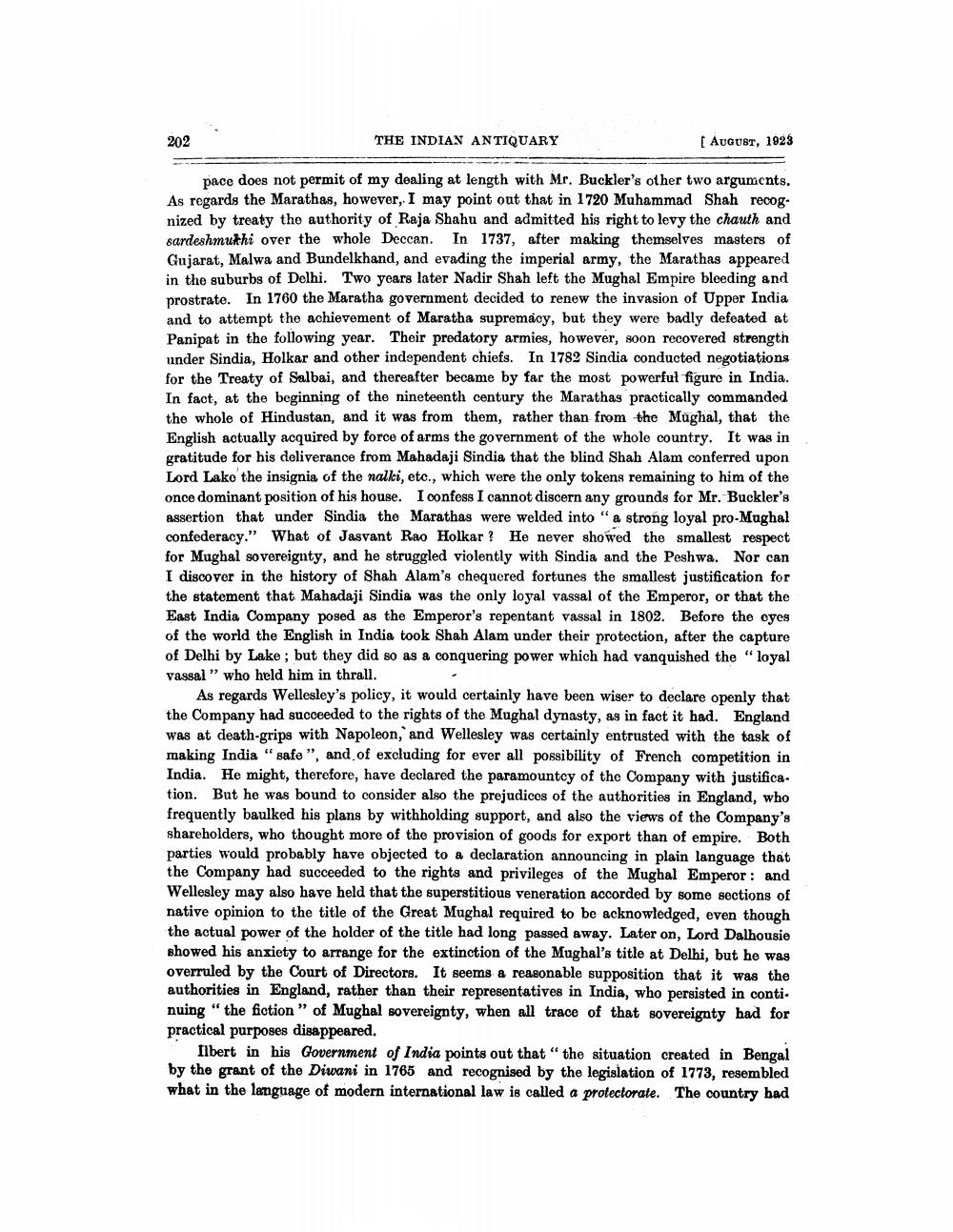________________
202
THE INDIAN ANTIQUARY
[ AUGUST, 1923
pace does not permit of my dealing at length with Mr. Buckler's other two arguments. As regards the Marathas, however, I may point out that in 1720 Muhammad Shah recognized by treaty the authority of Raja Shahu and admitted his right to levy the chauth and sardeshmukhi over the whole Deccan. In 1737, after making themselves masters of Gujarat, Malwa and Bundelkhand, and evading the imperial army, the Marathas appeared in the suburbs of Delhi. Two years later Nadir Shah left the Mughal Empire bleeding and prostrate. In 1760 the Maratha government decided to renew the invasion of Upper India and to attempt the achievement of Maratha supremacy, but they were badly defeated at Panipat in the following year. Their predatory armies, however, soon recovered strength under Sindia, Holkar and other independent chiefs. In 1782 Sindia conducted negotiations for the Treaty of Salbai, and thereafter became by far the most powerful figure in India. In fact, at the beginning of the nineteenth century the Marathas practically commanded the whole of Hindustan, and it was from them, rather than from the Mughal, that the English actually acquired by force of arms the government of the whole country. It was in gratitude for his deliverance from Mahadaji Sindia that the blind Shah Alam conferred upon Lord Lake the insignia of the nalki, etc., which were the only tokens remaining to him of the once dominant position of his house. I confess I cannot discern any grounds for Mr. Buckler's assertion that under Sindia the Marathas were welded into "a strong loyal pro-Mughal confederacy." What of Jasvant Rao Holkar? He never showed the smallest respect for Mughal sovereignty, and he struggled violently with Sindia and the Peshwa. Nor can I discover in the history of Shah Alam's chequered fortunes the smallest justification for the statement that Mahadaji Sindia was the only loyal vassal of the Emperor, or that the East India Company posed as the Emperor's repentant vassal in 1802. Before the eyes of the world the English in India took Shah Alam under their protection, after the capture of Delhi by Lake; but they did so as a conquering power which had vanquished the "loyal vassal" who held him in thrall.
As regards Wellesley's policy, it would certainly have been wiser to declare openly that the Company had succeeded to the rights of the Mughal dynasty, as in fact it had. England was at death-grips with Napoleon, and Wellesley was certainly entrusted with the task of making India "safe", and of excluding for ever all possibility of French competition in India. He might, therefore, have declared the paramountcy of the Company with justifica. tion. But he was bound to consider also the prejudices of the authorities in England, who frequently baulked his plans by withholding support, and also the views of the Company's shareholders, who thought more of the provision of goods for export than of empire. Both parties would probably have objected to a declaration announcing in plain language that the Company had succeeded to the rights and privileges of the Mughal Emperor: and Wellesley may also have held that the superstitious veneration accorded by some sections of native opinion to the title of the Great Mughal required to be acknowledged, even though the actual power of the holder of the title had long passed away. Later on, Lord Dalhousie showed his anxiety to arrange for the extinction of the Mughal's title at Delhi, but he was overruled by the Court of Directors. It seems a reasonable supposition that it was the authorities in England, rather than their representatives in India, who persisted in conti. nuing "the fiction" of Mughal sovereignty, when all trace of that sovereignty had for practical purposes disappeared.
Ilbert in his Government of India points out that "the situation created in Bengal by the grant of the Diwani in 1765 and recognised by the legislation of 1773, resembled what in the language of modern international law is called a protectorate. The country had




